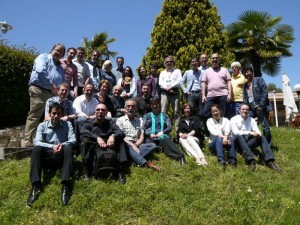The original post is in Portuguese, available on http://www.w3c.br/Noticias/Enda.

To widen the debate on open governmental data and attract new audiences, the W3C Brazil organized, in partnership with the Ministry of Planning (MP), the II Brazilian National Conference on Open Data, on November 21 and 22, 2013, held in the School of Finance Administration (ESAF) in Brasília.
The II Brazilian National Conference on Open Data was held on November 21 and 22, 2013, in the School of Finance Administration (ESAF) in Brasília. Organized by the W3C Brazil and the Ministry of Planning (MP), the objectives of the event were widening the debate on open governmental data and attract new audiences.
The II Brazilian National Conference on Open Data – ENDA was supported by the National Secretariat for Social Articulation of the Presidency, the Office of the Comptroller General-CGU, the Brazilian Internet Steering Committee-CGI.br, represented by the Brazilian Network Information Center-NIC.br, the Open Software Association, the Pontifical Catholic University of Rio de Janeiro-PUC-Rio, the Federal Service of Data Processing-Serpro, the Technology and Information Center of the Social Security-Dataprev, and the National Institute of Educational Studies and Research Anísio Teixeira-INEP.
The ENDA had an unconventional format. In the morning of each day, Keynotes Speakers made presentations, and during the afternoon themed tracks were conducted with one hour of provocations by experts with the aim of stimulating discussions. The rest of the afternoon was used to debate, develop and highlight proposals. Apart from the three tracks each day, parallel activities were held, such as lectures, workshops and an ontology course.
Keynotes

On the first day of the event, Irina Bolychevsky, from Open Knowledge Foundation, spoke about the impact of open data policy in democracies and explained how an open data policy can contribute to enlist citizens and create more transparent societies. Irina leads the CKAN project, a free platform that allows governments to create their own open data websites. The Brazilian open data repository, dados.gov.br, is CKAN-based.Access Irina’s presentation.
 In the second and last day, Ulrich Atz, chief of statistics of the Open Data Institute, talked about open data and sustainability. He explained, for example, how open data can create value for citizens, and also how they can help mitigate the effects of climate changes.Access Ulrich’s presentation.
In the second and last day, Ulrich Atz, chief of statistics of the Open Data Institute, talked about open data and sustainability. He explained, for example, how open data can create value for citizens, and also how they can help mitigate the effects of climate changes.Access Ulrich’s presentation.
Tracks
The proposals discussed and prioritized in each track are listed in the Federal Government Website: Participa.br.
*Economic Sustainability of Open Data*

This track was coordinated by Alexandre Gomes, from SEA Technology, and was divided into three phases: inspiration, transpiration and reflection. “The transpiration phase began with a big debate on the major obstacles to the implementation of an economic cycle around open government data.”
*Local Cases: Opening in States and Municipalities*
Bernadette Farias Loscio, professor at the Federal University of Pernambuco, coordinated the two days of this track. Four experts from local governments provoked the debate on the first day, and five provokers stimulated the debate on the second day, followed by discussions and prioritization of proposals. According to professor Bernadette, “the track Local Cases offered to the public the opportunity to learn about the major challenges faced when opening government data, as well as provided a forum for discussion on the role of open data in public administration”.
*Education in Open Data*

This track was coordinated by Everton Zanella Alvarenga (Tom), Executive Director of Open Knowledge Brazil. Tom created a questionnaire on Google that remained open for editing ten days before and ten days after the track.
*Privacy*
Victor Pimenta, from the Ministry of Justice – MJ, coordinated the track Privacy. According to Victor, this track “raised several discussions related to the apparent dichotomy between transparency and secrecy, addressing the theme of open data and its implications regarding privacy and protection of personal data when information on flexible and disaggregated formats are publicized”. Access the complete post about the track Privacy.
*Open Government: Government Data and Services for the Society and the Citizen*

The coordinator of this track was Patrícia Cornils, according to whom many provocations and debates occurred during the afternoon of November 21st. Read the complete report on Open Government.
Tracks with panels and lectures
*Track Interoperability*
Alexandre Lopes, from Serpro, coordinated the track Interoperability and started the debate with a lecture on the topic. Alexandre commented on the lack of interoperability, the challenges to overcome this problem and the need for developing a governmental ontology.
*Lecture – Design of APIs on Open Data*

Paulo Merson, from TCU, offered practical information to assist in the design and governance of open data services on the web, commented on some government initiatives, some patterns being used and the importance of communication.
** Lecture – Connection between ontologies, taxonomies and the business of the institution**
Frederico Bortolato spoke about the ontology of the legislative process in São Paulo. He showed the differences between the current Web and the Semantic Web, based on the case of São Paulo’s legislative process.
*Panel – Open Data in Public Companies of IT*
Leonardo Cezar, from Dataprev, explained how open data work in public companies, using as an example Dataprev’s case. Leonardo analyzed the infrastructure of open data, the reference architecture, the publishing stream, and the society’s contribution to this process.
Luís Cláudio Tujal, from Serpro, explained the open data project of this institution and the website www.dados.gov.br. He talked about the applied technology, the platform CKAn, the importance of Linked Data and the Cloud Computing Environment.
Homero Sampaio, from EMPREL, spoke about the case of data opening in the city of Recife to stimulate the development of applications. He explained the challenges, the technological platform used (CKAn) and the choice of formats with the aim of empowering citizens when fostering the development of applications.
*Track Data Visualization*

Diego Rabatone was the coordinator of this track and initiated the discussion with a presentation on Estadão Data. Diego spoke about the functioning of the “basômetro”, an interactive application to study party loyalty, allowing the user to analyze congressional voting according to criteria defined by him or her.
*Lecture – Guide to Data Journalism*
Tiago Mali, from ABRAJI, explained what is data journalism, the importance of giving meaning to data, and what is scientific journalism. Access the material given during Tiago Mali’s presentation.
*Lecture – Open Data on Courts of Audit*
Christiane Tavares C. de Albuquerque, from TCE-RS (Court of Audit of the State of Rio Grande do Sul), spoke about Rio Grande do Sul’s Information System for Audits and Accountability – SIAPC and how data were made available in an open format in this system. See Christiane Tavares’s presentation.
*Panel – Open Data in Legislative Houses*
Eduardo Miyashiro, from the São Paulo’s City Hall, spoke about the implementation of the Program of Open Data in the Parliament. He explained the interoperability between electronic voting system and the website and showed how participation and dissemination of the program were conducted, for example the Hacker Marathon. Read Eduardo Miyashiro’s presentation.
Joel Cezar Neto, from Legislative Assembly of Minas Gerais, spoke about data opening in this institution. He described the technological process, the applications, the expectations and future plans. Access Joel Cezar’s presentation.
Contests
*Contest for Open Data*

Conducted in partnership with the Ministry of Justice (Executive Secretariat and Federal Highway Police Department), with the Office of the Comptroller General and the Ministry of Planning, this contest occurred on Management Information System (SIGER)’s database, maintained by the Federal Highway Police Department. The rewards for the winning projects were laptops and ebook readers: Occurrences on Federal Highways; Macao Accidents.
*National Contest for Open Data*
Conducted by the Ministry of Planning with the goal of “encouraging the development of tools and visualizations based on open data, including those that use more than one database as sources”. The winners were:
Mapped Brazil; MTE Agencies; PAC Info; and Analysis of the Access to Education. Read the complete post on the contest.
Launchings
*Tool Kit for the Publication of Data in Open Format*
Tool Kit de para Publicação de Dados em Formato Aberto
The W3C Brazil has promoted various courses on open data in Brazil and Latin America, since 2010, in order to facilitate the study and training of people interested in publishing data in open format. All the content of these courses, an introductory video on the subject, as well as a basic text and a course in DL format (online) and videos of recorded lectures are available in the Tool Kit. An online course for publishing data in open formats held by the W3C Brazil and the Office of the Comptroller General in partnership with the Agenda Pública. Anyone interested can enroll for free in the site: Open data for Development – OD4D.
E-book with tips for not being tracked on the Web, part of Donottrack.us/cookbook. To download, visit this url.
Ontology Course

The course was specific to ENDA’s participants, focusing on Linked Data. It was divided into two parts:
1st: theoretical aspects were addressed: concept of ontologies from their philosophical path; the importance of methodological rigor in the creation of ontologies; differentiation between semantic web and linked data; and W3C standards.
2nd: practical aspects were addressed: focus on the use of the protégé; creation of a simple application ontology; queries in SPARQL; and manipulation of endpoints.
Fifty students attended the course offered by professors Seiji Isotani, Thyago Tenório and Ig Ibert Bittencourt, in the II School of Ontologies.
According to teachers’ reports, there was a dichotomy on the real application, because many of the students, although considering to be very important to use standards like RDF, also considered it unfeasible given the complexity and the time available within their institutions. Others disagreed, as some institutions had already established their own ontologies. It was also verified the need for further discussion: it was clear that the debate was very positive and that there was a consensus among participants that debates should continue in order to support future initiatives.
 Ana Paula Conte, joined W3C Brazil Office this month. She graduated in Data Processing and post graduated in Business Administration. She has been working at NIC.br for six years, has worked for four years with domain’s registration and 2 years in an administrative/financial department. She has experience in the administrative/financial area and also as a Web developer.
Ana Paula Conte, joined W3C Brazil Office this month. She graduated in Data Processing and post graduated in Business Administration. She has been working at NIC.br for six years, has worked for four years with domain’s registration and 2 years in an administrative/financial department. She has experience in the administrative/financial area and also as a Web developer. Vanessa Tonini, Web developer project analyst of W3C Brazil, left the office last June.
Vanessa Tonini, Web developer project analyst of W3C Brazil, left the office last June.













